|
April 3, 2013 - Vol. 2 No. 30
We Are the Opposition!
Unite in Action to Defeat Anti-Worker
Legislation!
|
Oppose the Austerity Agenda!
Picket at PC
Leader Tim Hudak's Constituency Office
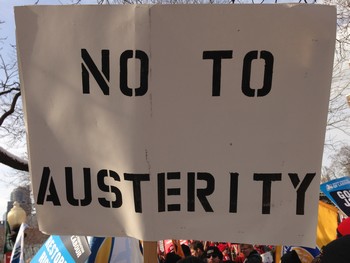 
Friday,
April 5 -- 3:30 pm
Called by:
Hamilton and District Labour Council,
Niagara and District Labour Council and Local 1005 USW
For
information: 905-547-1417
|
|
We
Are the Opposition!
• Unite in Action to Defeat Anti-Worker
Legislation!
• Oppose Use of Labour Board to Establish
Anti-Worker Precedents - Mira Katz
• Bogus Debate Over Illegitimate Austerity
Agenda - Rob Woodhouse
Education Is a Right!
Unite to Affirm the
Rights of All!
• Secondary Teachers' Federation and Government
Reach Tentative Agreement on Improvements to Imposed Contracts
- Enver Villamizar
• Post-Secondary Tuition Fee Increase Will Not
Solve the Crisis - Dan Cerri
• The Use of Education Funding to Advance
Private Interests
Coming Events
• National Day of Action to Stop Genetically
Modified Alfalfa
We Are the Opposition!
Unite in Action to Defeat Anti-Worker Legislation!
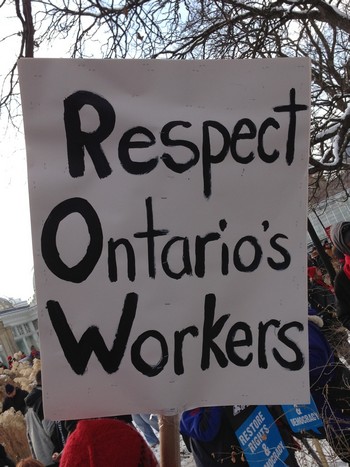 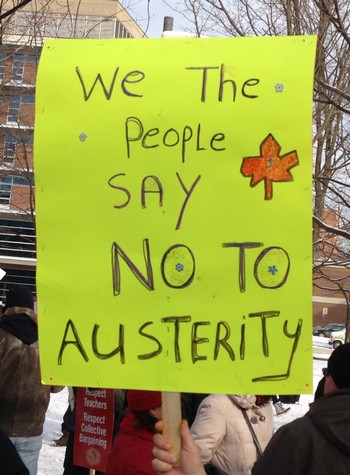 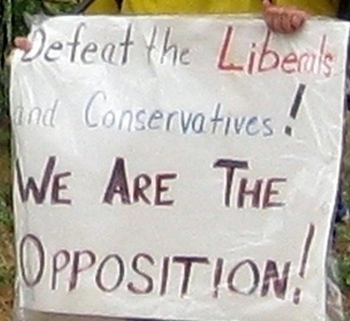
Four separate pieces of anti-worker legislation have
been put forward by the Hudak Conservatives in the Ontario Legislature
since it resumed sitting on February 19. One of these is Bill 5, the Comprehensive
Public
Sector
Compensation Freeze Act, 2013 that passed second
reading on February 28
by just one vote -- 36 to 35.
With Bill 5 the Conservatives are proposing a legislated
across-the-board freeze on all forms of compensation for all workers in
the broader public sector, including not just employees of the
Government of Ontario and its Crown agencies, but also employees of
municipalities, municipal agencies, employees of
colleges and universities, hospital and other health services and all
not-for-profit agencies and enterprises receiving public funds above a
set amount.
 Bill 5 is a follow up to the
Restraint Act passed
by the Liberals in 2010 that legislated wage freezes for all
non-unionized public sector employees and which was to be extended for
another two years with the Protecting Public Services Act
which died on the order paper with prorogation.
In essence, Bill 5 is a new version of the Protecting Public
Services Act and a new version of Bill 115, the Putting
Students First Act, 2012 for the broader public service. Bill 5 is a follow up to the
Restraint Act passed
by the Liberals in 2010 that legislated wage freezes for all
non-unionized public sector employees and which was to be extended for
another two years with the Protecting Public Services Act
which died on the order paper with prorogation.
In essence, Bill 5 is a new version of the Protecting Public
Services Act and a new version of Bill 115, the Putting
Students First Act, 2012 for the broader public service.
Bill 5 is based on the same criminal logic that billions
must be taken from public services in order to pay the moneylenders and
free up billions for pay-the-rich schemes. This direction was
overwhelmingly opposed when the government used its arbitrary powers to
impose it in the education sector. Now is the
time to step up the organizing against this new round of anti-worker
legislation and unite in action to build on the advances made to date
in affirming the rights of all. It can be done! It must be done!
Other Anti-Worker Bills Tabled by the Hudak
Conservatives this Session
Bill 17, Workplace Safety and Insurance Amendment
Act (Alternate Insurance Plans), 2013. Bill 17 is a private
member's bill tabled by PC MP Randy Hillier. It reverses recent
regulations expanding the scope
of workers covered by the Workplace Safety and Insurance Board,
allowing some businesses to purchase private workers' compensation
insurance. It is currently at first reading.
Bill 22, Helping Ontarians Enter the Skilled Trades
Act, 2013. Bill 22 is a private member's bill tabled by PC MP
Garfield Dunlop. It would establish an apprentice/journeyman ratio of
1:1 in the skilled trades and extinguish negotiated arrangements
between the building trades unions and construction
companies which regulate the apprentice/journeyman ratio. It is
currently at first reading.
Bill 25, Sick Days are for Sick People Act,
2013. Bill 25 was defeated at second reading on March 21. It had been
tabled by PC MP John O'Toole. It would have eliminated the banking of
sick days by any workers across the broader public sector and
eliminated the cashing out of sick days in any
form. It would have also extinguished negotiated contract provisions in
public sector contracts.

Oppose Use of Labour Board to Establish
Anti-Worker
Precedents
- Mira Katz -
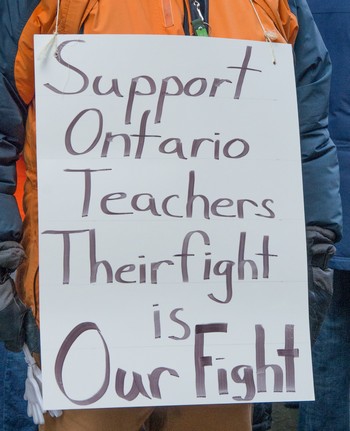 The Ontario Labour Relations
Board heard arguments on
April 2 on whether to proceed with issuing a decision on whether or not
the Elementary Teachers' Federation of Ontario (ETFO) advised its
members to engage in an illegal strike when it advised them to pause
their participation in extra-curricular activities
in response to the government's imposition of non-agreements. The two
school boards that brought the original complaint against ETFO to the
Labour Board are Upper Canada and Trillium Lakelands. The chair of the
Labour Board, Bernard Fishbein, did not rule on the matter on April 2,
however he indicated that
a written ruling would be issued soon. The Ontario Labour Relations
Board heard arguments on
April 2 on whether to proceed with issuing a decision on whether or not
the Elementary Teachers' Federation of Ontario (ETFO) advised its
members to engage in an illegal strike when it advised them to pause
their participation in extra-curricular activities
in response to the government's imposition of non-agreements. The two
school boards that brought the original complaint against ETFO to the
Labour Board are Upper Canada and Trillium Lakelands. The chair of the
Labour Board, Bernard Fishbein, did not rule on the matter on April 2,
however he indicated that
a written ruling would be issued soon.
During the hearing, ETFO argued that as a result of the
withdrawal of its advice to members regarding extracurriculars and the
ongoing discussions with government the Labour Board should "seize" the
matter, essentially pausing any ruling to permit the process that is
unfolding to play out rather than compromising
it. Prior to the hearing, ETFO lawyer Howard Goldblatt said: "The
question is, what is the status of the board's decision given the
recent announcement by ETFO with respect to extracurricular and
voluntary activities? That's the issue that's going to be addressed
briefly -- whether the (labour relations) board should
issue a decision, or not issue a decision. Our position is that there
is no labour relations purpose now; we will be arguing that fully."
The two school boards have now made it clear that they
are not simply interested in getting extra-curriculars back -- which
they and the government originally claimed was their goal -- to defend
students' welfare. Their aim is to undermine the thinking and
organization of teachers and education workers. The boards
are now openly demanding that the Labour Board use the situation to
establish a precedent so that teachers and education workers have no
mechanism to defend their rights in the face of imposed non-agreements
and the broad violation of their rights. Just as Bill 115 was
supposedly "Putting Students First" by attacking
those who teach students, the school boards claim their action seeks
redress for students as victims.
Upper Canada Chair Greg Pietersma said: "We weren't just
seeking a ruling on the current situation, but to give us direction in
future because this has happened too many times, using
extra-curriculars as a bargaining tool." Trillium Lakelands Chair Karen
Round agreed: "We need to know the Labour Relations
Board's position one way or the other -- we're looking for clarity in
the long term. We need a decision."
Clearly the school boards who are pushing for a ruling
against the teachers want to eliminate a very effective measure that
teachers and education workers have used to say No! to dictate and to
alert the public to the government's violation of their rights. The
school boards' claim to be acting on behalf of the
children is most disingenuous. It is the teachers and education workers
who are the victims of bullying and are affirming the right of all
workers to dignity by saying No! This is a stand in defence of the
rights of the students, their parents and everyone else who works for a
living. The school board's actions beg
the question: why are the school boards going after the victims for
trying to defend themselves? Why are the school boards not standing
with their teachers and education workers in opposing the violation of
rights? Why would school board officials take such a stand when they
are under the same dictate from the
provincial government and threatened with takeover if they do not
submit? Why not take a stand for rights rather than attack the victims?
 The claim that teachers and
education workers were using
extra-curricular activities as a bargaining tool is bogus indeed given
the fact their inability to bargain is precisely what the fight is
about. Extra-curricular activities were withdrawn because teachers and
education workers were not permitted to bargain.
Right from the outset the government eliminated bargaining by stating
that either the unions voluntarily accept the theft of $2.19 billion
from education or it would be legislated. Then it acted on this threat,
passing Bill 115 and using its powers to impose non-agreements. For
representatives of school boards to now
paint teachers and education workers as the problem is
disgraceful. The claim that teachers and
education workers were using
extra-curricular activities as a bargaining tool is bogus indeed given
the fact their inability to bargain is precisely what the fight is
about. Extra-curricular activities were withdrawn because teachers and
education workers were not permitted to bargain.
Right from the outset the government eliminated bargaining by stating
that either the unions voluntarily accept the theft of $2.19 billion
from education or it would be legislated. Then it acted on this threat,
passing Bill 115 and using its powers to impose non-agreements. For
representatives of school boards to now
paint teachers and education workers as the problem is
disgraceful.
The Government of Ontario is laying low behind the
scenes using the Labour Board proceedings as a pressure point in its
talks with the unions. No doubt it is also hoping that the Labour Board
will do their dirty work for them, after which they can claim that
teachers and education workers have said they respect
the Labour Board and will accept its rulings. The situation is a real
test of the government's claim about having respect for teachers and
education workers and the work they do. Will the government now take a
stand and affirm that teachers and education workers have the right to
decide what they do with their
time outside of teaching?
Regardless of what transpires, teachers and education
workers have shown that they will not accept the violation of their
rights. They have steadfastly upheld their dignity and in so doing the
dignity of all workers. They will not accept being victimized or
bullied.

Bogus Debate Over Illegitimate Austerity Agenda
- Rob Woodhouse -

Since the Ontario Legislature resumed sitting on
February 19, it has been the stage for a continuous bogus debate
between the Liberals and the Conservatives over how best to impose the
illegitimate austerity agenda demanded by the rich for Ontario, in the
face of its broad rejection by the public. In this manner
the rich are hoping to destroy the public opinion that has developed,
especially during the period of prorogation and culminating in the mass
rally at the Liberal Leadership Convention, that workers have rights
and governments must affirm them.
Their debate frames the question in the following manner
in order to pretend that there is no alternative to the illegitimate
agenda they are both peddling: How can austerity be implemented most
effectively, through legislative dictate or through negotiations and
voluntary compliance?
The Hudak Conservatives have called for using more
legislation to impose austerity on workers as was done with Bill 115.
They have put forward four separate pieces of anti-worker/anti-union
legislation in the past month. In addition to this legislative assault,
Hudak also introduced several motions to attack public
sector pensions and to make teachers' voluntary extra-curricular
activities mandatory, something the Ontario Labour Relations Board is
currently considering.
In the debate, the Wynne Liberal government pretends its
stand on austerity is to achieve it through negotiations and voluntary
compliance by public sector workers -- as if it hasn't already used
legislation in the manner proposed by the Conservatives. In response to
a question from the Conservatives requesting
an across-the-board public sector wage freeze, Premier Wynne said:
"What the member opposite is arguing for is an outcome. He's arguing
that there should be wage constraint. We are making the same argument.
We have different methodologies to get there, but the outcome has to be
the same. I agree that we need
wage constraint. That's why we've been on the path that we've been on
for the last year. That's why we have negotiated the zero-zero
agreements that we have negotiated. We are working to the same goal,
but we are not going to use the same mechanism as the member opposite
is suggesting, because we really
believe that working in partnership, working with the public sector
employees, we can get there, and we're demonstrating that that's
possible."
The stands of both the Hudak Conservatives and the Wynne
Liberals are despicable anti-worker positions which base themselves on
the anti-worker notion that workers, workers' rights and workers'
organizations should be whipped from pillar to post through both
legislation and coercion to impose austerity. The
Liberal position of austerity through "negotiations" is a bogus attempt
to fool the gullible into believing that there is a "fair" way to
impose an illegitimate agenda which will somehow be acceptable.
Even when the form of negotiations is used by the
Liberals, the content is coercion. The Liberal position is for
voluntary compliance with austerity by workers; but "voluntary"
compliance is always backed up by legislative dictate or the threat of
legislation, the same mechanism the Conservatives advocate. The
Liberal claim that they are "not going to use the same mechanism" as
the Conservatives is patently false. Such deception begs the question:
Do the Liberals think the workers and people of Ontario wake up in the
morning and forget about what happened yesterday, like the characters
in the movie Groundhog Day?
 It was only six months ago
that the Liberals and the
Conservatives collaborated to pass Bill 115, stripping teachers and
education workers of their collective bargaining rights. The terms Bill
115 imposed on teachers and education workers are still in effect today
and the Liberals and Conservatives who approved
this legislation are still sitting in the Legislature. As well, the
workers in the Ontario Public Service, community college faculty,
public service professionals and many other workers settled contracts
in "negotiations" in which the government used Bill 115 as a gun to
workers' heads to blackmail them with legislation
similar to Bill 115 being used against them. It was only six months ago
that the Liberals and the
Conservatives collaborated to pass Bill 115, stripping teachers and
education workers of their collective bargaining rights. The terms Bill
115 imposed on teachers and education workers are still in effect today
and the Liberals and Conservatives who approved
this legislation are still sitting in the Legislature. As well, the
workers in the Ontario Public Service, community college faculty,
public service professionals and many other workers settled contracts
in "negotiations" in which the government used Bill 115 as a gun to
workers' heads to blackmail them with legislation
similar to Bill 115 being used against them.
The Liberal government is still using this coercion as
it enters negotiations for collective agreements with other public
sector workers. Workers at the Liquor Control Board of Ontario (LCBO)
are currently in negotiations and the Wynne government is dictating a
four year wage freeze, a two tier wage structure
and other contract concessions for them. Wynne's message is: submit to
austerity measures or else.
The more the workers say No! and find mechanisms to turn
their No! into an organized force, the more desperate the Liberals and
PCs are becoming in trying to pass off an illegitimate agenda as the
only way forward.

Education Is a Right! Unite to Affirm the
Rights of All!
Secondary Teachers' Federation and Government
Reach
Tentative Agreement on Improvements
to Imposed Contracts
- Enver Villamizar -
On March 31, Ontario Secondary School Teachers'
Federation (OSSTF) President Ken Coran informed members around the
province that as a result of meetings held with government
representatives and school board officials over the past eight weeks,
an agreement had been reached. He said the agreement "provides
for improvements in several areas of imposed conditions, including
unpaid days, future grid, sick leave, maternity leave, support staff
job security, retirement gratuity payout for members with non-vested
gratuities, benefits, local bargaining, graduated return to work."
Imposed conditions refers to the non-agreements
the government imposed on teachers and education workers using the
powers it gave itself in Bill 115.
Education Minister Liz Sandals also issued a statement
concerning the tentative agreement. She made sure to point out that the
changes her government is permitting to the imposed terms do not
involve any return of the $2.19 billion it is stealing from the
education sector with the imposed non-agreements. She
also made a mockery of the truth, suggesting the amendments to the
imposed terms let the government off the hook for its violation of
rights.
Sandals stated: "I am pleased that we have come to an
agreement in principle with OSSTF that is focused on the fair and
consistent application of the existing collective agreements, while
reflecting the ministry's fiscal situation. The government and OSSTF
have been able to resolve implementation concerns
identified in a number of areas including: sick leave, maternity leave,
retirement gratuity, unpaid days, and local bargaining."
Claiming to permit a few minor changes in how one
will abuse someone and that this makes the abuse "fair" and even
something the abused person agrees to is criminal. But this is
precisely how the government is conducting itself.
The tentative agreement with the government will be
discussed by OSSTF first with Bargaining Unit Presidents, Chief
Negotiators and members of the provincial Collective Bargaining
Committee on April 4, after which it will be shared with members. In
his message, Coran announced that a provincial vote of
all affected OSSTF members will be held on the agreement.

Post-Secondary Tuition Fee Increase
Will Not Solve the Crisis
- Dan Cerri -
The Ontario government has announced that over the next
four years tuition fees will increase for Ontario's post-secondary
students at an average of three per cent and five per cent for
undergraduate and graduate
programs, respectively. Minister of Training, Colleges and Universities
Brad Duguid tried to put a positive spin on the
theft of money from the pockets of Ontario's students and families by
claiming that the three per cent increase is lower than previous rate
increases. In
2006, the government lifted a tuition fee freeze and has since
implemented increases at five per cent per year for undergraduate
programs and eight per cent
for graduate studies. The media is
presenting the announcement as a "cap" on tuition fee increases.
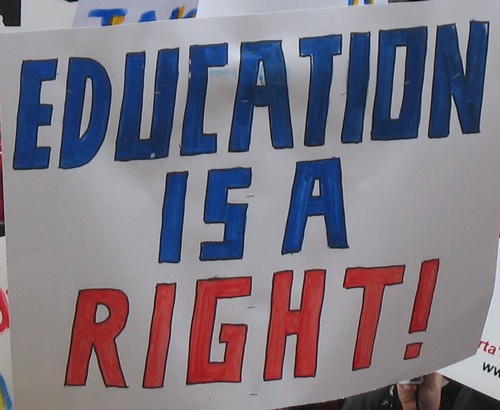 Student groups are
responding to the announcement. The
Canadian Federation of Students (CFS) points out that undergraduate and
graduate university students in Ontario already pay the highest tuition
fees in the country, making it clear that a cap on tuition increases
will only make matters worse. They also point out
that since 2005 student debt owed to the banks which hold Ontario
student loans has doubled from $1.15 billion to more than $2.6 billion.
This makes it clear that the government is shifting its debt and
deficit onto the backs of the youth which they must then pay back with
interest so the banks can profit from them and their families.
CFS-Ontario has released a report
entitled Changing Priorities Moving
Towards Affordable Post-Secondary
Education with recommendations for more affordable
post-secondary
education. The report recommends the government implement a multi-year
tuition fee framework that reduces
tuition fees by 30 per cent over three years, establishes a long-term
plan to progressively eliminate tuition fees and ensures that tuition
fee billing policies and practices are fair for students. Student groups are
responding to the announcement. The
Canadian Federation of Students (CFS) points out that undergraduate and
graduate university students in Ontario already pay the highest tuition
fees in the country, making it clear that a cap on tuition increases
will only make matters worse. They also point out
that since 2005 student debt owed to the banks which hold Ontario
student loans has doubled from $1.15 billion to more than $2.6 billion.
This makes it clear that the government is shifting its debt and
deficit onto the backs of the youth which they must then pay back with
interest so the banks can profit from them and their families.
CFS-Ontario has released a report
entitled Changing Priorities Moving
Towards Affordable Post-Secondary
Education with recommendations for more affordable
post-secondary
education. The report recommends the government implement a multi-year
tuition fee framework that reduces
tuition fees by 30 per cent over three years, establishes a long-term
plan to progressively eliminate tuition fees and ensures that tuition
fee billing policies and practices are fair for students.
Post-secondary institutions are already indicating that
"tough times are ahead" as an expected portion of their new revenue
from tuition fees will not be available as they had initially budgeted.
The concerns expressed by post-secondary administrators are a reaction
based on their reliance on previous tuition fee
increases of between five and eight percent because funding from the
government has been severely reduced. The government had warned
post-secondary institutions to plan for drastic cuts to their budgets
for the next two years.
The government's news release included the following
logic for the decision:
"The previous framework would have allowed colleges and
universities to increase tuition by an average of five per cent each
year. Under the new framework, annual tuition fee increases will be
capped at an average of three per cent, only one percentage point above
the average inflation rate in Ontario over
the past 10 years."
Duguid described the tuition fee increase as "striking a
balance" between keeping post-secondary education affordable while
ensuring that it remains competitive internationally and also helps
institutions with long-term financial stability.
 The announcement is a
further
indication that the "new"
Liberal government under Premier Wynne is following the same austerity
agenda as the previous McGuinty government while trying to present
itself as being "fair" and even protecting students by "capping"
tuition fee increases. It does nothing to hide the
fact that degradation of the entire education system is part of the
anti-social offensive being advanced in Ontario and across the country.[1] This offensive is to attack
public right that benefits the people while making them pay out of
their pockets for social programs and
services. But government is at the beck and call of the monopolies and
other private interests when they come calling for handouts. The announcement is a
further
indication that the "new"
Liberal government under Premier Wynne is following the same austerity
agenda as the previous McGuinty government while trying to present
itself as being "fair" and even protecting students by "capping"
tuition fee increases. It does nothing to hide the
fact that degradation of the entire education system is part of the
anti-social offensive being advanced in Ontario and across the country.[1] This offensive is to attack
public right that benefits the people while making them pay out of
their pockets for social programs and
services. But government is at the beck and call of the monopolies and
other private interests when they come calling for handouts.
It is disturbing that the government suggests that
students' concerns are only about affordability and that these concerns
"must be balanced" with the concerns of post-secondary institutions for
financial stability. Students should be involved, along with their
parents, educators, administrators and others in determining
the interests of post-secondary institutions. It is the government,
through its implementation of the austerity agenda of the rich, that is
causing a rift by cutting funding for education and increasing tuition
to make up for funding shortfalls.
Note
1. See TML Daily, April 2, 2013 - No. 42.

The Use of Education Funding to Advance
Private Interests
Investigations into how funds for education are being
used continues to reveal that spending for this sector is used to
advance various private interests. The following are some examples
based on
highlights of the 2013-2014 budget for a Greater Toronto Area college.
The budget reveals how money is allocated in a way
that suggests improvements to the college but also indirect ways of
giving money to private interests, such as construction companies and
technology firms. For example, one of the budget items is referred to
as a "corporate systems review" in the amount
of $1,800,000. Some of this money is being budgeted for online
management systems that are run by private external companies. This
also relates to the emphasis on more online learning described as
"creative and innovative" by the Ontario government and currently being
implemented as themes for individual institutions.
There is an additional budgetary item in the amount of $2,500,000 to
work with a marketing firm to build a brand strategy.
Infrastructure monopolies will also be lining up to make
big scores based on a total of over $50 million allocated for
various infrastructure developments, mainly in the area of expansions
to buildings.
In comparison to these budgetary items that will
transfer public money to private interests, $1,700,000 is budgeted for
additional full-time faculty positions and $90,000 for professional
development funds.
Faculty and staff at the college are now being asked to
contribute to a fund to raise money for the college, with some
administrators already contributing substantial sums of their own
money. This particular college is taking on characteristics of a
private institution with its own administrators now putting money
into it as if putting shares into a company.
Discussion among faculty has included the concern that
there is no budgetary committee made up of predominantly faculty
members and that the only decision on the budget rests with the Board
of Governors. Several committees have been established that are
supposed to be faculty-driven but they are limited
to so-called "academic issues" that are already established, negating
the chance for faculty to participate in decisions at higher levels,
including the aim and direction for the budget. It raises the question
of exactly what constitutes an "academic issue."
Meanwhile, the Liberal government has announced that an
annual tuition fee increase will continue over the next four years at
an average of three per cent per year. It confirms the "new" Liberal
government's plan to continue to use tuition as a way to subsidize
funding shortfalls, putting more of the burden on
students and their families. The response by colleges and universities,
such as fundraising and attracting more students that represent
"funding units," is undoubtedly due to the government's recent
announcement that individual institutions should plan budgets by
cutting spending by $40 million this year and $80 million
next year.

Coming Events
National Day of Action to Stop
Genetically Modified
Alfalfa
April 9, 2013 --
Stop GM Alfalfa!
The National Farmers Union in Ontario in conjunction
with the Canadian Biotechnology Action Network has called for a
national day of action for April 9, 2013 to stop the commercial release
of genetically modified (GM) or genetically engineered alfalfa. They
are calling for actions to be held at MPs'
constituency offices on the day.
The following reasons for the Day of Action are provided
from the NFU:
Why Is Stopping GM Alfalfa Urgent?
 Monsanto's GM alfalfa could
be registered for use in
Eastern Canada this April. GM Roundup Ready alfalfa varieties have just
been cleared for the last step before they hit the market -- all they
need now is a final registration rubber-stamp by the Canadian
Food Inspection Agency. The Canadian Seed Trade Association and its
corporate members including Monsanto, Pioneer and Forage Genetics
International are also actively trying to get support for the release
of GM alfalfa. Monsanto's GM alfalfa could
be registered for use in
Eastern Canada this April. GM Roundup Ready alfalfa varieties have just
been cleared for the last step before they hit the market -- all they
need now is a final registration rubber-stamp by the Canadian
Food Inspection Agency. The Canadian Seed Trade Association and its
corporate members including Monsanto, Pioneer and Forage Genetics
International are also actively trying to get support for the release
of GM alfalfa.
Because alfalfa is a perennial plant that is pollinated
by bees, genetically modified alfalfa will inevitably cross-pollinate
with non-GM and organic alfalfa, threatening the livelihoods of family
farmers across Canada. Prairie farmers have already rejected GM alfalfa
for these reasons so now the industry is trying
to introduce GM alfalfa in Eastern Canada.
Why Is GM Alfalfa Such a Huge Threat?
GM contamination is inevitable because alfalfa is a
perennial crop pollinated by insects. In Ontario, weeds are becoming
resistant to glyphosate (the active ingredient in Monsanto's herbicide
Roundup): another glyphosate tolerant crop like Roundup Ready
alfalfa would increase these weeds. Alfalfa is almost always grown in a
mix with grasses and establishes readily without the use of herbicides.
Farmers don't want or need Roundup Ready alfalfa. If GM alfalfa is
released in Eastern Canada, it will have
negative impacts on a wide range of farmers and farming systems, both
conventional and organic.
Why Is Alfalfa Important?
Alfalfa (commonly harvested as hay) is a high-protein
forage fed to animals like dairy cows, beef cattle, lambs, poultry and
pigs. It's also used to build nutrients and organic matter in the soil,
making it particularly important for organic farming. If it's
introduced, GM
alfalfa will ruin export markets for alfalfa products, contaminate
family farms, make it more difficult for farmers to control weeds, and
threaten the future of organic food and farming in Canada.
How Can I Organize an Action in My Community?
The National Farmers Union and the Canadian
Biotechnology Action Network have produced an action kit with details
on how to make your action successful. We have posters, flyers,
information on GM alfalfa and other materials to help you.
For more information please see the CBAN website or feel
free to email Ann Slater in Ontario or call her at (519) 349-2448; or
outside of Ontario email Cathy Holtslander in Saskatoon or call (306)
652-9465 or call CBAN for direct support or to discuss ideas -- call
Lucy Sharratt, Coordinator, Canadian Biotechnology
Action Network at 613-241-2267 ext 25 or email Lucy.
Also visit the National Farmers Union webiste at www.nfu.ca.

PREVIOUS
ISSUES | HOME
Read Ontario Political Forum
Website: www.cpcml.ca
Email: ontario@cpcml.ca
|

